isis


That was a bumper sticker Sojourners published at the outset of the Iraq war more than a decade ago. American church leaders had not only opposed the war but offered an alternative: "An Alternative to War for Defeating Saddam Hussein, A Religious Initiative." We not only presented it to Colin Powell’s personal council and Tony Blair, but also printed full-page ads in every major British newspaper the day before their Parliamentary debate and vote on the war. The U.K.’s Secretary of State for International Affairs, Clair Short, told me the only real alternative on the table in their Cabinet meetings was “The American church leaders’ plan,” which, she said, was seriously discussed. U.S. and U.K. leaders showed they were drawn to an alternative plan to war that would remove any weapons of mass destruction that Saddam Hussein might have had (which he did not) and even to ultimately remove him from power but without going to war. Pope John Paul II was also opposed to the potential war. Both the Vatican and the American church leaders warned that the potential costs of a war in Iraq could include increasing the scope and threats of international terrorism. ISIS is that sad prophecy come true; the habit of war prevailed.
I have always believed that any alternative to war must still address the very real problems at hand — just in a more effective way. To say that “war is not the answer” is not only a moral statement but also is a serious critique of what doesn’t work; wars often fail to solve the problems and ultimately make them worse. War has to answer to metrics, just as more peaceful alternatives do. The war in Iraq was a complete failure with enormous human and financial costs; ISIS is now one of the consequences.
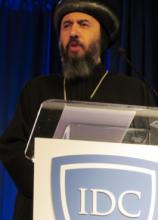
Watching ancient Christian communities stand nearly defenseless as Islamic militants roll across swaths of the Middle East, coalitions of Christians are banding together to sound the alarm and demand government action.
The most recent effort is a three-day conference (Sept. 9-11) in Washington, D.C., which gathered Orthodox Christians, evangelicals, Roman Catholics and others for prayer, speeches and a lobbying push on Capitol Hill.
“If Christian voices are able to ring out as one from Egypt to Syria to Iraq, Lebanon and Jordan, then we really do believe it will be possible for Middle Eastern Christians to survive,” said Andrew Doran, executive director of In Defense of Christians, which organized the conference.
Doran, who describes himself as a Catholic with a great affinity for Orthodox Christianity, said the gathering has shown how Middle Eastern Christians can put aside their sometimes 1,500-year-old disagreements and take up the cause of their beleaguered brethren.
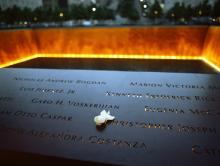
It’s been 14 years since our government declared war on terrorism. How are we doing? It feels like a disastrous game of Whack-A-Terrorist, doesn’t it? We kill one terrorist hiding in one hole, and out pops another one from another hole. Now we are facing the newest threat, a terrorist organization seeking to set up a nation-state, ISIS or IS, as its leadership prefers to be called. The Islamic State, at least, would be a concrete opponent. If they hold on to territory and establish a functioning government, we could at least declare war on a tangible target. Though regrettable it would at least make sense within the logic of war in which states fight other states.
In a recent article for Patheos.com, David French uses Christian Scripture as a justification for “responding to ISIS with wrath and vengeance.” French is a lawyer, a captain in the U.S. Army Reserve and senior counsel at the American Center for Law and Justice. He claims that, according to the Apostle Paul’s letter to the Romans, while individuals are called upon to love their enemies, there is no such call placed on governments. In fact, God has instituted governmental authority in order to execute his wrath against evildoers. And apparently, or so Romans 13 puts it according to French, to know who the evildoers are one simply needs to look at who governments are punishing. French quotes the relevant passage, Romans 13:3-5:
For rulers hold no terror for those who do right, but for those who do wrong. Do you want to be free from fear of the one in authority? Then do what is right and you will be commended. For the one in authority is God’s servant for your good. But if you do wrong, be afraid, for rulers do not bear the sword for no reason. They are God’s servants, agents of wrath to bring punishment on the wrongdoer. [Emphasis added by French.]
French concludes that American Christians should have no difficulty determining the correct response to ISIS. Why? By the fact of determining that justice must be executed against ISIS, our government has determined that their violence is not only an offense against American citizens (he names the beheading victims, journalists James Foley and Steven Sotloff) but against God himself.
French’s analysis strains credulity. Doesn’t he realize that the Romans to whom Paul was writing were themselves victims of government persecution? Does he think that these persecuted Christians felt they were being justly punished? And what about Paul himself, a Roman citizen who was persecuted and executed by the Roman government? Doesn’t French realize that by his own argument, the Roman authorities were executing God’s judgment against Paul? And by his own analysis, French is a captain in a military force that is from its origins a justifiable target for God’s wrath. Why? Because the founding act of the United States was a rebellion against a government, and “whoever resists authority resists what God has appointed, and those who resist will incur judgment.” (Romans 13:2)

Eight years ago this Sept. 12, Pope Benedict XVI delivered a lecture at the University of Regensburg in Bavaria in which he seemed to diagnose Islam as a religion inherently flawed by fanaticism.
It was an undiplomatic assertion, to say the least — especially coming a day after the 9/11 anniversary — and it sparked an enormous outcry among Muslims and came to be seen as one of a series of missteps that would plague Benedict’s papacy until he resigned last year.
Now, with the Islamic State on the march in the Middle East, leaving a trail of horrifying brutality and bloodshed that has shocked the world, some of Benedict’s allies on the Catholic right are saying, in effect, “He told you so.”
“Regensburg was not so much the work of a professor or even a pope,” wrote the Rev. Raymond de Souza in a column for the National Catholic Register, a conservative publication. “It was the work of a prophet.”

Children are suffering from violence in the U.S. and around the world.
Michael Brown. The children of Gaza. The refugees of Central America. Only three of numerous heart-breaking stories to fill the airwaves in the last month. But, unlike the gruesome murders of innocent news reporters by ISIL, these news stories about violence toward unarmed children have faced loud voices justifying that violence.
These voices argue for the “rule of law.” They insist on the inherent goodness of hyper-militarized, monocultural police forces using tanks and tear gas against peaceful protestors. They claim the inherent righteousness of the state of Israel, even after the bombing of United Nations schools. They defend border guards and those who clamber into busses to scream violence and hate at asylum-seeking children.
So, the wounded or dead are put on trial and convicted for their own deaths, even though they were unarmed children. It’s their fault. To say otherwise is just foolishness.
Some Corinthian Gentiles and Jews must have reacted in exactly this way to the teaching of Paul. Jesus was crucified by the Romans — the imperial power that had brought peace to the city of Rome and quiet to the provinces, that legendary pax Romana about Augustus Caesar himself boasted. This was Paul’s testimony.

When churches conclude their summer hiatus and resume full-scale ministries this week, much will have changed from a year ago — outside their doors.
Conditions might have changed inside, too. But it is the world outside that demands fresh attention in mission and ministry.
Ferguson, Mo., has happened, revealing disturbing trends in law enforcement and deep fault lines between white experience and black experience.
Russia’s aggression against Ukraine happened, threatening a resumption of dangerous tensions between Moscow and Western democracies.
The Islamic State of Iraq and Syria happened, raising the dreaded specter of a take-no-prisoners war on modernity, reason, progress, women and other faiths.
The 113th Congress happened, mired in systemic dysfunction, with one party determined to cripple a black president and to channel more wealth to the wealthy.
The Koch brothers and their megabuck cronies happened, changing the face of electoral politics with unprecedented infusions of cash and ideological vitriol.
The two-tier economy happened, with one tier doing extraordinarily well and a much, much larger tier falling further behind, leaving despair among all age groups.
Border wars between terrified migrants and swaggering white men bearing arms against children happened, threatening America’s true core value as a welcoming nation promising freedom.
These outside-the-walls developments have little to do with the usual church fussing — except to say that it’s time for church people to stop their usual fussing.

“What did you do on your summer vacation?”
Even now students may be answering that question in essays at the start of this new school year. Maybe you wrote such a paper years ago. No matter what you did or where you went this past summer, it was almost impossible to escape the heaviness of the headlines. #BringBackOurGirls has become a distant refrain, almost forgotten beneath the crush of summer tragedies:
Thousands of children traveled alone from Central American countries to enter the U.S. as refugees. Ebola deaths spread to more West African nations killing hundreds including many health workers. The forces of ISIS, intent on carving out an Islamic caliphate, took over major Iraqi cities and beheaded a U.S. journalist in Syria. Russia usurped Crimea and threatened the rest of Ukraine. The U.N. refugee agency announced in late August that “the number of refugees, asylum-seekers and internally displaced people worldwide has, for the first time in the post-World War II era, exceeded 50 million people.” Gaza has been reduced to rubble while Hamas rockets still fly toward Israeli cities. Michael Brown, an eighteen-year-old African American man who might have started college this week, was shot and killed by a white police officer in the waning days of August.
After such a summer, how can we do anything but scoff at Paul’s words from Romans?

From the moment news broke that U.S. journalist James Foley had been beheaded by Islamic State extremists in the Middle East, many Christians, especially Foley’s fellow Catholics, began calling him a martyr, with some even saying he should be considered a saint.
Yet that characterization has left others uneasy, and the discussion is raising larger questions about what constitutes martyrdom.
Foley’s parents seemed to validate the martyrdom label when his father, John, spoke at an emotional news conference outside the family’s New Hampshire home and said he and his wife “believe he was a martyr.” Foley’s mother, Diane, added that her son “reminds us of Jesus. Jesus was goodness, love — and Jim was becoming more and more that.”
In an interview two days later with Katie Couric, Foley’s younger brother, Michael, recounted how Pope Francis had called the family to console them and in their conversation “referred to Jim’s act as, really, martyrdom.”
Numerous commentators had already picked up on that idea, holding Foley up not only as a witness to the Christian faith but as a spur for believers in the West to take more seriously the plight of Christians in Iraq and elsewhere in the Middle East who are being persecuted to a degree that some say is comparable to genocide.
But in the Catholic Church, determining whether someone is a martyr is not so easy. Historically, two conditions must be met.

Pope Francis wrote to the president of Iraq, calling for an end to the “brutal suffering of Christians and other religious minorities” and urging political leaders to end the humanitarian crisis in the country.
Francis said in his letter to Iraqi President Fouad Massoum:
“I appeal to you with my heart full of pain while I follow the brutal suffering of Christians and other religious minorities who are forced to leave their homes, as their places of worship are destroyed.”
Cardinal Fernando Filoni, the pope’s official envoy to Iraq, delivered the pope’s message during his recent trip to that country. The two met at the Vatican on Thursday. The pope previously appealed to U.N. Secretary-General Ban Ki-moon to intervene to end the crisis.
Earlier this week, Francis revealed during a media conference with reporters that he was ready to travel to Iraq to try to find a solution to the ongoing violence.
Video courtesy of USA Today.
They’ve done this before.
Once again, John and Diane Foley appeared on national television Wednesday to speak in clear and deliberate voices about their son, conflict journalist James Foley — only this time, it wasn’t to plead for his release from captors but to hail him as a hero who wanted to help people and to thank the public for the outpouring of support that has flooded in since officials confirmed a videotaped beheading of their son was authentic.
Standing in front of the family home in Rochester, N.H., John Foley told reporters in the kind of voice of strength he and his wife have displayed over the years, “We’ve been through this before. Let ‘er rip.”
In years past, the Foleys have taken to television to draw attention to the cause of their son, who was abducted in November 2012 in Syria and also held captive for 44 days in 2011 after being captured in Libya.
Account after account describes the Foleys as determined, faithful Roman Catholics. After their son disappeared in 2012, they launched the FreeJamesFoley.org website to serve as a clearinghouse for information that might lead to his release. In October 2013, they joined Today’s Matt Lauer to wish their still-captive son a happy 40th birthday and to keep his cause alive. Even when interviewers noted that Foley’s career took him to many volatile places, his father was quick to defend him.

An Islamist group has gained ground in the northeastern Libyan city of Benghazi, declaring it an Islamic territory and raising fears that radical Islamist militias may spread in the rest of Africa.
The declaration from Libya’s Ansar al-Sharia movement mirrors the rise of the Islamic State in northern Iraq and Syria. The two militant movements share similar goals.
The prospect of more fighting and the possible disintegration of Libya, the country where NATO allied forces helped topple strongman Moammar Gadhafi in October 2011, sent chills throughout the nation.
“I think this is a risky way to go,” said Sheikh Saliou Mbacke, a Senegalese Muslim leader who is the coordinator of Inter-Faith Action for Peace in Africa.
“It hinges on the failure of the governments, lack of democracy and poor and unequal distribution of resources,” added Saliou.
These latest actions reflect the growing influence of Islamists in Africa, where militants are challenging existing governments.
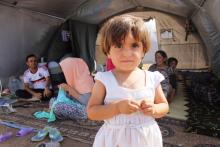
The crisis in Iraq poses two challenges — a humanitarian effort to rescue persecuted minorities, and a security mission to suppress the extremist threat posed by the forces of the Islamic State in Iraq and Syria (ISIS).
The U.S. is right to play a leading role in aiding the Yazidis, Christians, and other threatened minorities in Iraq. The immediate threat against the Yazidis has eased, but minority groups in the region remain endangered by violent extremism. The Obama administration should work through the United Nations to turn this into a genuine international rescue effort. The greater the degree of international participation and support for the aid mission, the more beneficial and legitimate it will be for the recipients.
The U.S. is also right to call attention to the threat posed by ISIS, but we need to do more to mobilize international pressure against the group. The Islamic State is in many respects more dangerous than al Qaeda. It has conquered Mosul and other major cities, taken control of dams and oil facilities, and is steadily expanding its sphere of influence in Syria and Iraq. It has formed a terrorist army with an estimated 10,000 fighters and is now armed with tanks and advanced U.S. weapons stolen from the Iraqi army. The group poses a significant threat to the security of the region and the world.

How do you talk about joy in times like these and not sound like a traveling salesman with a bottle of snake oil up his sleeve?
Recently, I received word that Robert Gittelson, the cofounder of Conservatives for Comprehensive Immigration Reform, had died suddenly from a massive heart attack. Over the next seven days, the prolific 63-year-old comedian and actor, Robin Williams, committed suicide, and revered screen legend, Lauren Bacall, passed away at the age of 89.

Alarm and outrage has been growing over the mounting humanitarian crisis in Iraq at the hands of the Islamic State (IS) also known as ISIL (Islamic State of Syria and the Levant) or ISIS (Islamic State of Iraq and Syria).
Christians in the region are being forced to convert, pay tribute or die as the al Qaeda breakaway group sweeps into predominantly Christian villages and Hamlets in Iraq, sending tens of thousands fleeing for their lives. Other non-Muslim groups, in particular the Yazidi, who practice a faith that predates Islam, are reportedly considered as infidels by the fanatic Islamic State and targeted for extermination in what many are calling a genocide. The U.N. is still gathering numbers but it believes that hundreds of Yazidis have been killed while others, primarily women, have been abducted and taken into slavery. Around 40,000 Yazidis have fled into the mountains of Northwest Iraq where they face the prospect of starvation on mountain or massacre by the Islamic State militants below.
The news is devastating and overwhelming. The suffering and acts of brutal violence staggers the imagination. What would a nonviolent response look like?
Police cars have been repainted to say “Islamic police.” Women are forbidden from wearing bright colors and prints. The homes of Shiites and others have signs stating they are property of the Islamic State. And everyone walks in fear amid a new reign of terror.
That’s what life is like in Mosul, Tikrit, and other cities in northern and western Iraq under the control of Islamic extremists after their lightning-fast military campaign that overwhelmed the Iraqi army in June.
The new normal for these residents means daily decrees about attire and raids to root out religious minorities in a campaign to impose strict Islamic rule in cities that tolerated multiple religions for centuries.
Video courtesy of USA Today.
THE DEEPENING CRISIS gripping Iraq is a clear and present danger to global security. The crisis is fundamentally political in nature, however, not military. It cannot be resolved through the use of force, least of all by external military action from the United States. In the past, U.S. intervention has been the problem in Iraq, not the solution. Indeed many of Iraq’s current problems can be traced to the consequences of the U.S. invasion and occupation.
The United States now has a responsibility to help the Iraqi people, having contributed so much to their current travails, but our involvement should be diplomatic and humanitarian, not military. We should work through the United Nations to exert pressure on the violent extremists who are threatening the region and to mobilize international support for political and diplomatic solutions to the conflicts.
A major center of concern today is the extremist group called the Islamic State of Iraq and Syria, now identifying as the Islamic State. This group led the military takeover of Mosul and other Iraqi cities. It is a direct offshoot of the al Qaeda forces that emerged during the armed resistance to the U.S. invasion, but is now a rival to, and even more extreme than, al Qaeda.
Prior to 2003, al Qaeda did not exist in Iraq. It was only after the U.S. invasion, which shattered the state and sparked widespread violence and insurgency, that Islamist extremist groups were able to gain a foothold in Iraq. American actions fostered staggering levels of corruption and exacerbated growing Sunni-Shia sectarian tensions.
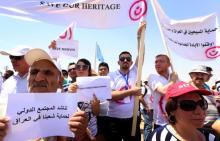
When I first saw Americans joining in solidarity with Iraqi Christians through the #WeAreN hashtag and protest campaign, I was encouraged. Our team at Preemptive Love Coalition had been sounding the alarm about the targeted persecution of minorities in Iraq through private emails and social media messages for weeks, in between making urgent appeals in our effort to provide lifesaving heart surgeries for children amid the violence.
Most of our efforts were largely unsuccessful before the “Islamic State” gave Mosul’s Christians an ultimatum to (1) convert to Islam; (2) pay a submission tax; or (3) “face the sword.”
After Islamist militants began marking the homes of Christians in red paint with the Arabic letter “N” (Nazarene) for extermination or expropriation, we tried again to use our proximity to the problem in Iraq to provoke our friends in America to pay attention by tagging a photo “#WeAreN,” in which I had symbolically marked myself with an Arabic “N.”
But it was not strictly an act of solidarity with Iraqi Christians. We had the targeting of Turkmen, Yezidi, Shabak, and even Sunni Muslims in view, as well. #WeAreN was more about the marking of Christians; less about the marking of Christians.
Muslims and minorities across Iraq immediately sensed the gravity of the tactics deployed by the Islamic State: if one group is marked, we are all marked. If we stand by in silence today while others are marked for extinction, our time will come, and there will be no one left to stand for us.
In response, Muslims across Iraq joined together in protest, prayer, and viral photographs saying “We are Iraqi. We are Christians.”
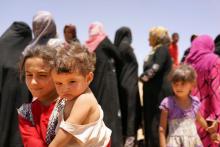
The horrible human costs and increasing danger the world is now facing in Gaza, Ukraine, and Iraq show the consequences of not telling the truth. And unfortunately, we seem to mostly have political leaders who are unwilling to admit the truth of what’s happening, deal with root causes instead of exploiting symptoms, and then do everything possible to prevent the escalation of violence and further wars. Instead we have politicians who are mostly looking for opportunities to blame their political opponents, boost their own reputations, and protect business interests. As people of faith, we are called to speak the truth in love.
It’s time for some truth telling.